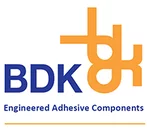From wearable health monitors and wound dressings to ostomy devices and diagnostic patches, adhesives ensure that medical devices stay securely in place while protecting the skin beneath.
The right adhesive is key for device performance, patient comfort, safety, and meeting stringent regulatory standards. At BDK, we specialise in advanced adhesive solutions precisely tailored for demanding medical applications and supporting customers at every step, from concept to commercial production, and understand the importance of adhesive testing in medical device design.
Meeting Complex Functional Demands
Medical adhesives must meet far more demanding requirements than everyday tapes or adhesives. They must bond securely yet peel away gently, conform to complex body contours, and maintain breathability to prevent skin irritation.
On top of this, they endure a host of environmental and mechanical stresses: moisture from sweat or bathing, constant movement, body heat, dwell time on the skin, and the device’s own weight.
Different applications pose unique challenges; long-wear ostomy appliances, for example, require robust, moisture-resistant adhesion, while short-term diagnostic patches must adhere reliably but remove without discomfort.
Why Adhesive Testing Is Non-Negotiable
Given these demands, thorough adhesive testing is not just practical, it’s essential. Adhesive failure can cause device detachment, leading to patient harm, costly recalls, and reputational damage.
Rigorous testing validates performance, supports regulatory submissions, and ensures manufacturing consistency. It also helps procurement teams assess total lifecycle costs and mitigate risks. Regulatory frameworks, such as FDA guidance and ISO 13485, emphasise the need for documented testing to prove safety and effectiveness.
Essential Adhesive Tests for Medical Devices
Screening & Benchmarking Tests
- Peel Strength (at 180°, 90°, or T-peel configurations) measures the force required to remove the adhesive under controlled conditions
- Shear Strength assesses how well an adhesive resists forces that could cause it to slide or detach over time
- Tack Testing determines the adhesive’s initial stickiness and how quickly it bonds.
Biocompatibility Tests
These include cytotoxicity, skin irritation, and sensitisation assessments in line with ISO 10993 standards, ensuring that adhesives are safe for direct contact with human skin.
Ageing & Stability Testing
These examine how adhesives perform after prolonged storage or under varying environmental conditions.
Wear Tests
Starting with small-scale trials involving a handful of users, can progress to larger studies of 20–30 people to gather real-world data on comfort, performance, and removal. This is an invaluable step before clinical trials.
Seamless Integration with Device Development
Adhesive testing should begin at the concept stage and continue through prototyping, design verification, and pre-launch validation. Data gathered early informs design iterations, supports risk analyses, and strengthens regulatory submissions.
Close collaboration with a trusted adhesive partner, like BDK, ensures that adhesives are optimised alongside the device design, not as an afterthought.
Testing to Minimise Risk & Maximise Value
Quality testing data reduces procurement risk, supports informed decision-making, and helps balance cost-efficiency with long-term reliability and compliance. It safeguards total cost of ownership by avoiding failures, customer complaints, and costly recalls. It also guarantees supply chain consistency and traceability which is a must for regulated industries.
As you can see, the importance of adhesive testing in medical device design is paramount. At BDK, we combine decades of expertise with in-house testing facilities and technical support. We work closely with customers to develop, prototype, and manufacture custom adhesive solutions that meet exacting performance and regulatory requirements. By investing in thorough adhesive testing, we help you deliver medical devices that patients trust and that perform exactly as intended. Speak to our experts about your adhesive testing needs today.
